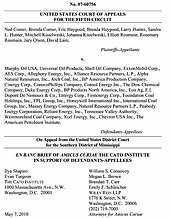Learn more about Cato’s Amicus Briefs Program.
Mississippi homeowners sued 34 energy companies and utilities operating in the Gulf Coast for damage sustained to their property during Hurricane Katrina. The homeowners alleged that the defendants had emitted greenhouse gases, which increased the concentration of greenhouse gases in the atmosphere, which contributed to global warming, which accelerated the melting of glaciers, which raised the global sea level, which increased the frequency and severity of hurricanes, which caused the destructive force of Hurricane Katrina. The district court concluded that it lacked the authority to resolve the public debate over global warming and dismissed the case. A Fifth Circuit panel reversed this dismissal, however, holding that the homeowners have standing to raise some of their claims and that those claims are appropriate for resolution by the federal courts. The Fifth Circuit granted the defendants’ petition for rehearing en banc. Cato filed an amicus brief on the energy companies’ behalf, arguing that homeowners lack standing to bring their suit and that the case raises a nonjusticiable political question. Our brief asserts that the homeowners’ claim does not provide a clear causal connection between the harm suffered and any particular conduct by the energy companies, and that the money damages the homeowners requested would not remedy the environmental harm alleged. More importantly, we maintain that political questions such as those surrounding climate change must be resolved by Congress, not the federal courts. Put simply, the Constitution prohibits federal courts from resolving highly technical social and economic policy debates. Permitting plaintiffs to achieve “regulation by litigation” would not only contradict settled Supreme Court precedent, but would betray the separation of powers principles embodied in the Constitution.

This work is licensed under a Creative Commons Attribution-NonCommercial-ShareAlike 4.0 International License.

